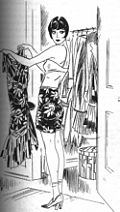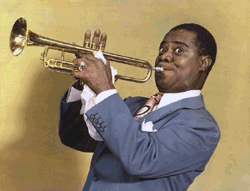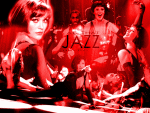 |
“Jazz is the only indigenous American
art form and it is truly a cultural product of the United States. Western
and African musical culture were the seeds of jazz, but America was
the soil where jazz grew and prospered” (Grandy). This category of music
is not solely from one race, but rather, it is from a combination of
individuals of different races, heritages, and traditions. In a city
where individuals of different races, ethnicities, and economic classes
segregated themselves, jazz became a means towards blending these citizens
together. Jazz provided a way in which individuals could express themselves,
no matter if they were Black or White. |
“After World War I, America was a new
world super-power with a full decade of great economic prosperity” (Grandy).
This period in history is often referred to as the “Jazz Age” and the
“Roaring Twenties”. It was a time of prosperity and the mood of Chicagoans
and the atmosphere of the city soared. Not only were women taking advantage
of their new social rights by flaunting their sexuality, cutting their
hair short and wearing scandalous dress apparel, but they were also
acquiring new political freedom. Jazz was America’s popular music style
of the time. Jazz was performed at social gatherings, hotels, and even
saloons. This period marked a time when people let loose and danced
the night, along with their worries, away. Jazz not only helped bring
people of different races together, but it also helped lighten up every
one’s frame of mind. The war was finally over. Individuals expressed
their joy and sense of pride through jazz. |
 |
 |
Famous jazz musicians, including King
Oliver and Louis Armstrong, “had migrated north to Chicago and were
now performing in the vibrant environment of the city” (Grandy). Besides
the gangsters and organized crime, the city was a “thriving metropolis”
(Grandy) and seemed like the perfect place for some of the top jazz
musicians to come popularize this new style. “Armstrong was so important
to the evolution of jazz that some people even call him the "father"
of jazz. As Armstrong aged, other jazz musicians would call him "Pops"
as a sign of respect” (Grandy). Armstrong became an icon in the city
because he helped Chicagoans, even those living in poverty, to feel
the emotions that jazz invoked in its lyrics and rhythm. |
The movie Chicago
highlights the importance of music (especially jazz) during the Roaring
Twenties. Much like other means of entertainment during the early part
of the century, jazz provided a way for the inhabitants of Chicago to
escape the harsh realities. However, unlike the other forms of entertainment,
jazz was a social breakthrough in terms of music, paving the way for
a handful of other genres of music. It was much more than simply music;
jazz was a new way of living and a new way to look at life. |
 |
